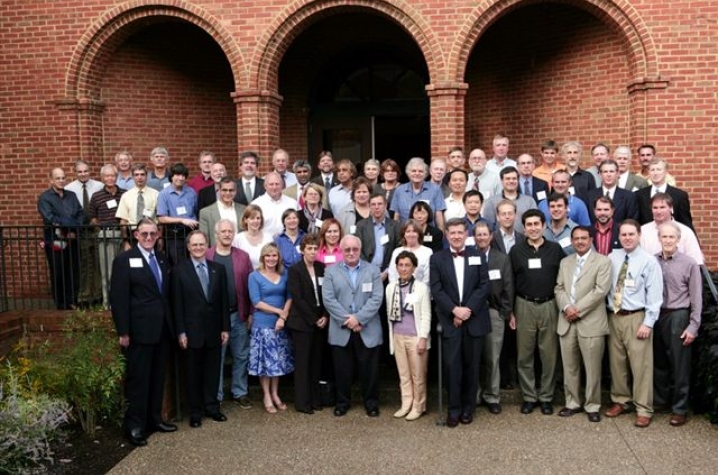Kentucky's Community of Experts

LEXINGTON, Ky. (Nov. 3, 2010) - An endowed chair or professor embodies the subject matter he or she studies to the highest degree.
These are the individuals who establish the nature of a university — its customs, expectations, its vision and ideas. But the contributions of these professors go beyond the abstract. Eighty percent of the University of Kentucky's patents have come from endowed professors, contributing an annual return on investment of $750,000.
At UK, everyone will have the opportunity to benefit from these multi-talented individuals through the Council of Endowed Professors and Chairs, created in 2009 to enhance academic life on campus.
UK has more than 250 endowed chairs from all 16 colleges and Undergraduate Education's Chellgren Center, due in part to the 1997 Research Challenge Trust Fund, more commonly referred to as "Bucks for Brains."
Four years ago, Douglas Scutchfield, Peter P. Bosomworth Professor of Health Services Research and Policy, was struck by the fact that there was a lot of senior intelligence on campus and a lot of capacity for collaboration.
"I thought that the university could take better advantage of these people collectively," Scutchfield said. "There was a range of ideas across the university to accomplish a number of things, and there is not a lot of discourse between and amongst the various parts of campus, either."
UK is unusually comprehensive in its range of disciplines, which makes mobilization across campus all the more difficult. The colleges range from those typical to a land-grant institution, to one with a substantial arts and sciences campus, to the medical center — a fairly broad range of potential areas of knowledge and faculty expertise.
"With the wide range of programming offered, we even had trouble coming up with a complete list of endowed professors on campus," Scutchfield said.
But Scutchfield didn’t give up on his idea, and as the number of endowed professors and chairs continued to rise, he met with Provost Kumble Subbaswamy in early 2009 to hatch a plan.
"Dr. Subbaswamy had already been thinking of a group along these lines, and he gave intellectual, as well as financial help," Scutchfield said. "The 'Bucks for Brains' initiative was economic, but both the president and Subbaswamy fought hard for longer-term investments in all areas that would make the university great, not just those that would have big return on grants or patents. We felt that a rising tide should raise all boats."
Scutchfield and an organizing committee representing colleges from across campus met in early March 2009. The group, which included professors from design, economics, education, engineering, health sciences, history, physiology, political science, public health and social work, among others, identified objectives for the proposed Council of Endowed Professors and Chairs.
The council's goals include promoting endowed professors and chairs to become better acquainted; to advance and enrich intellectual life on campus; helping UK create more endowed professorships and chairs; and providing campus guidance to help with major issues of education, research and engagement on campus.
The committee scheduled a full meeting of all endowed professors and chairs in September 2009, and since then, the council is only increasing its presence on campus and in the community.
The Boone Center library now contains a burgeoning collection of books and treatises that reflect the scholarship of the Council of Endowed Professors and Chairs, and all are freely available for use by members of the UK community. Members meet regularly at the Boone Center and attend First Friday receptions with their best and brightest students in tow.
The council is passionate about recruiting the best and brightest students to UK and works with the Office of Undergraduate Admissions to help recruit high-level students through personalized correspondence and speaking engagements. Members have also traveled with President Lee T. Todd Jr. to address state legislators about the crucial importance of the Research Challenge Trust Fund.
In addition to the council's current work, the esteemed group is creating a speakers bureau composed of senior endowed faculty members in their respective fields of scholarship and who are highly-experienced speakers. Audiences will include student groups, alumni organizations, state legislators and community agencies, among others.
The Council will also sponsor a series of public forums addressing topics of common concern on campus beginning Nov. 19, when Russell Porter, deputy director of USAID, will speak on US reconstruction efforts in Haiti. In coming months, students, staff faculty and the community will be invited to hear experts from the UK faculty and invited lecturers who speak with authority on all sides of an issue.
Scutchfield stepped down as founding secretary in March 2010, handing the reins of the council to Mike Reid, the Shih-Chun Wang Professor and chair of the Department of Physiology. "Mike has done a lot of the heavy lifting to get this council off the ground," Scutchfield said. "I feel confident with the group in his hands."
While the council has made great strides, there is still more to accomplish, especially with the continued reduction in funding for higher education. "The problems of the state of Kentucky require people of different disciplines to come together to solve them," Scutchfield said. "We have the potential to make a contribution. It just depends on how it's used, and if it's used."




